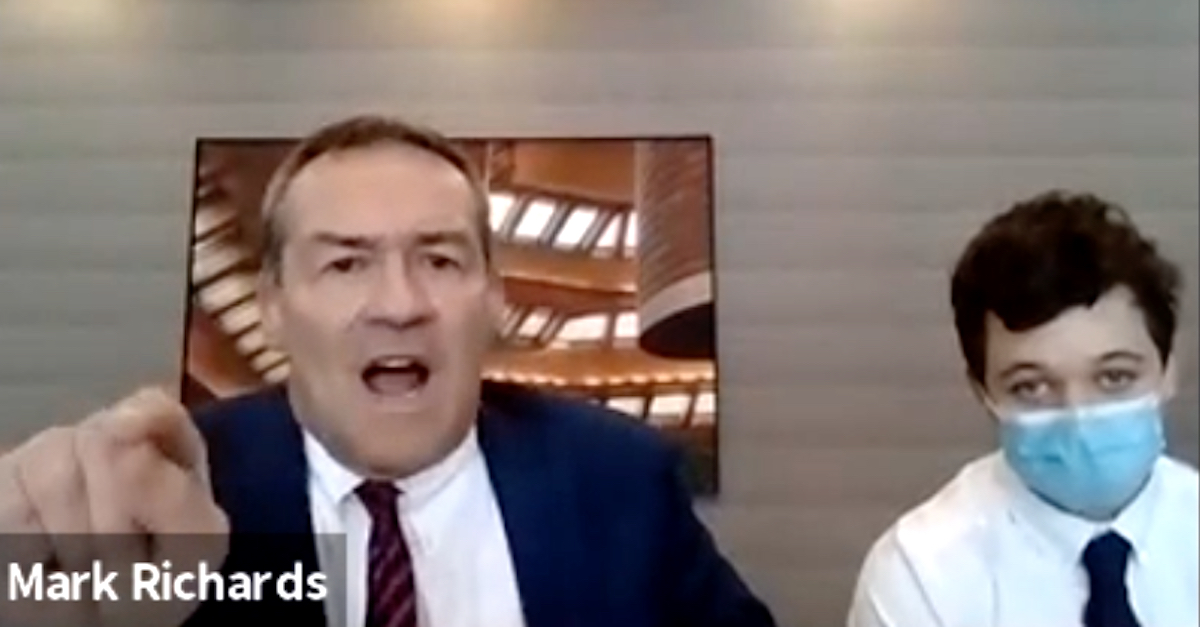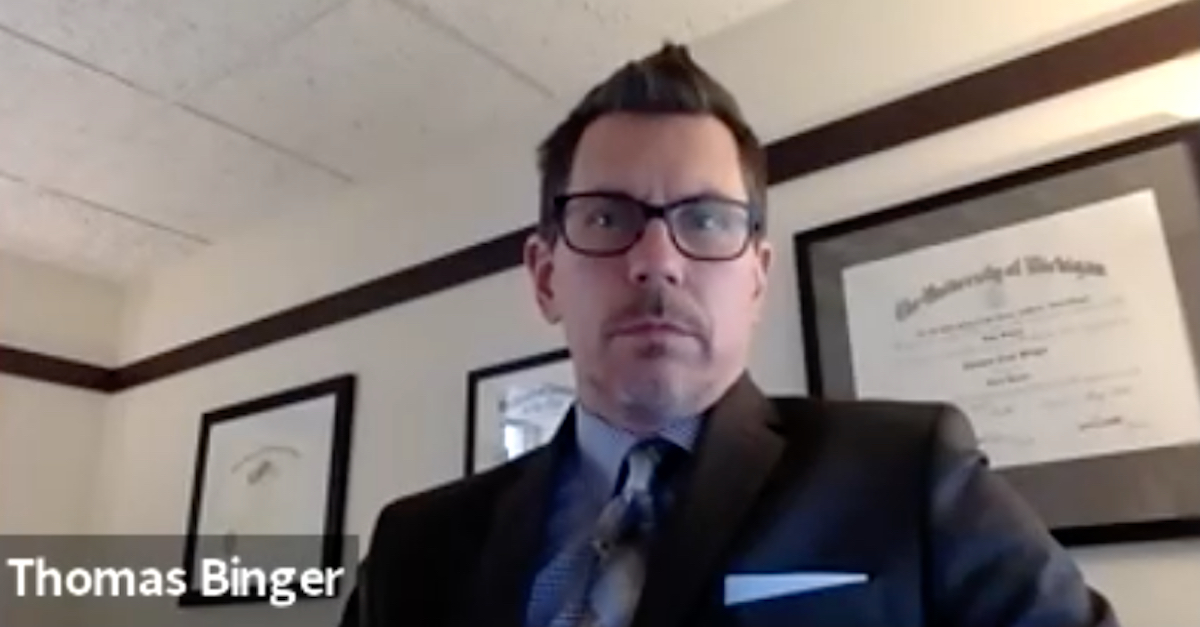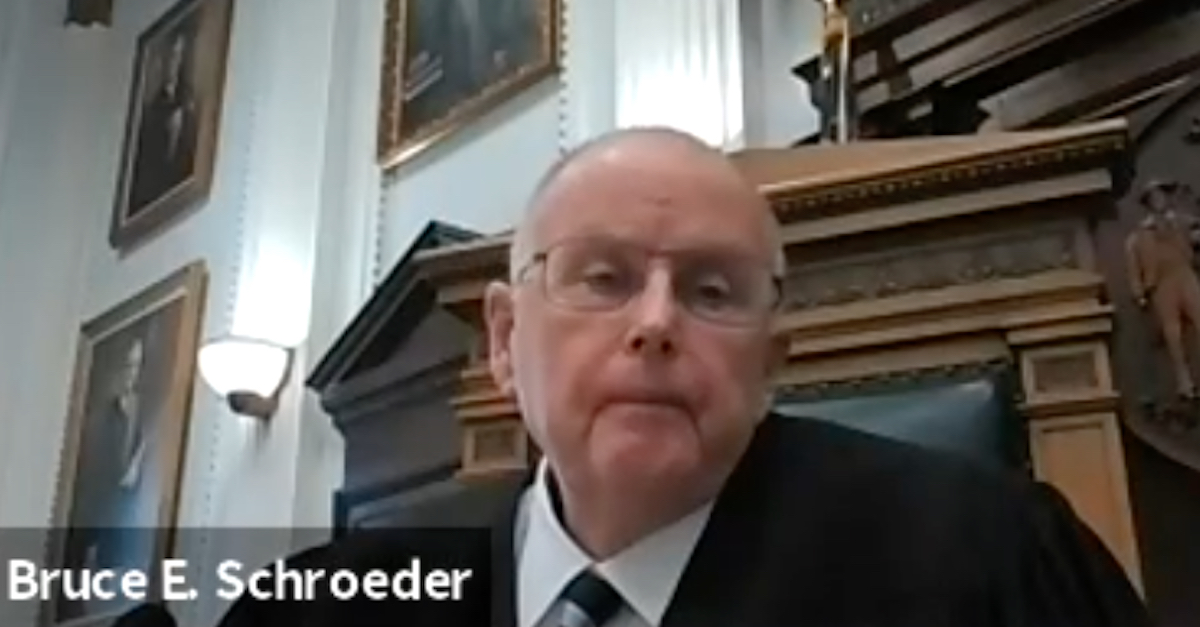
Attorney Mark Richards makes an emphatic point while seated next to his client, Kyle Rittenhouse, in a remote videoconference hearing on Feb. 11, 2021.
A Wisconsin circuit court judge on Thursday pounded Kenosha County District Attorney Thomas Binger over arguments that alleged murderer Kyle Rittenhouse failed to keep the court accurately advised of his current address.
Ultimately, the judge refused Binger’s requests to increase Rittenhouse’s bond or to re-arrest Rittenhouse after court documents were returned as undeliverable from Rittenhouse’s last known address.
Rittenhouse “is thumbing his nose” at his own bond requirements to keep the court updated about said address pursuant to Wisconsin law, Binger unsuccessfully argued. Binger also accused Rittenhouse of going out and drinking, wearing inappropriate slogans on t-shirts, and flashing white supremacist symbols while out on bond.

Kenosha County District Attorney Thomas Binger
Rittenhouse, now 18, is accused of murdering Joseph Rosenbaum, 36, and Anthony Huber, 26, after bringing a weapon to racially charged protests in Kenosha, Wisconsin, after the police shooting of Jacob Blake in Aug. 2020. He’s accused of injuring Gaige Grosskreutz. Rittenhouse was 17 at the time of the killings and is from Illinois.
Judge Bruce E. Schroeder was unimpressed by Binger’s pleas to know where Rittenhouse was located and routinely characterized the prosecutor’s arguments as bail restrictions rather than as address updates.
Schroeder said he doesn’t know where “international business” defendants are located — they are allowed to leave the country as they please while their cases continue, he suggested — and he noted that his “border county” of Kenosha frequently allows defendants to cross into neighboring Illinois unless a judge places a restriction upon a defendant. No such restriction was initially placed on Rittenhouse, Schroeder noted from the record.
“To issue a warrant now for a defendant who’s appeared at every hearing — I’d be breaking the law,” Schroeder said.
Schroeder said that bail was not merely a “privilege.”
“Bail is a right,” Schroeder said with reference to the constitution.
But he agreed that Rittenhouse wasn’t completely square with the court.
“If he’d have left a forwarding address, that probably would have been full compliance,” Schroeder said of the defendant. “We’re interested in an address where we can send notices” for hearings and other courts processes.
“So, he’s in violation,” the judge said, referencing Rittenhouse.

Judge Bruce E. Schroeder
But he noted that he’s “never jailed” a defendant who, while appearing in court, said his address on file with the court needed to be updated.
“We amend their address on our records. They might be barked at a little bit for violating the court’s argument, but that’s all that happens,” Schroeder said.
Schroder failed to acknowledge the difference between a defendant appearing in court and updating an address with Rittenhouse’s situation, which involved a court suddenly learning that Rittenhouse wasn’t at the address he provided.
The judge said he couldn’t recall a defendant’s bond amount ever being raised — which is what prosecutors requested against Rittenhouse.
“I’m going to deny the motions,” Schroeder finally ruled.
“I do think that — I understand the concern — and my heart goes out to everybody involved, this is a terrible thing,” Schroeder said to those listening — including prosecutors, the families of those affected by the shooting, and Rittenhouse and his defense attorney. Schroeder said he wanted the case handled “peacefully, fairly, and impartially.”
Schroeder also said he feared for the safety of the defendant.
“I don’t want anymore problems. The police don’t need anymore problems. We don’t need people’s safety in jeopardy in any way,” Schroeder said.
Schroeder noted that his courthouse windows and doors were “still boarded up” after the “ghastly event” known worldwide as the Kenosha protests.
He agreed with Rittenhouse’s defense that Rittenhouse’s address should “be kept from public scrutiny.”
Then, the judge ordered Rittenhouse to provide “exact physical location of his place of his abode” to the clerk “to keep it privately, to be given to me, to be given to whomever the sheriff designates as the commanding — the person responsible for full knowledge of the whereabouts of the defendant — and that is to be kept secret by the sheriff’s office.”
Rittenhouse’s attorney said he would provide the address by 5:00 p.m. Central time — less than two hours after the hearing ended.
The district attorney asked that his office be given the secret address as well.
“No,” the judge said.
He ordered that the DA’s office deal with the sheriff’s department if it really needed the address.
Binger said he needed to know Rittenhouse’s address in case he filed additional charges.
“We’ve never been denied this information” in any other case, Binger told the judge.
“This is highly irregular,” Binger said, citing his office’s legal duty to enforce Wisconsin’s laws. “We cannot do our job without this information.”
“The sheriff can keep on top of this,” Schroeder said.
Rittenhouse’s attorney, Mark Richards, shot back that any future charges could be sent to his law office and that Rittenhouse would be in court “the next day.”
Richards then accused the DA of “posturing” after the core ruling had been issued.
Binger tried arguing that the sheriff’s jurisdiction wouldn’t extend to Rittenhouse’s presumed whereabouts in Illinois should a problem arise.
Schroeder shut down the hearing without responding.
The hearing was contentious from start to finish.
It began with Binger complaining that Rittenhouse went to “unusual” means to secure his $2 million bail through donations.
Schroeder interrupted Binger’s attempt to posture the case to say that he’d already watched video of Rittenhouse’s initial appearance before a different judge. As such, Schroder said he knew that the prosecution was already aware that Rittenhouse was not living at the address he provided — and was instead living in a so-called “safe house.”
“You already knew this at that time, and in fact you brought it to Judge Keating’s attention,” Schroeder said. “If this has already been presented and argued before Judge Keating, um — what triggered the — the motion now?”
“What specifically triggered it is the return the court received,” Binger said. The court sent a notice to the Defendant of an upcoming hearing which was unable to be forwarded to a correct address and was returned.
Binger said the judge was correct — he knew Rittenhouse was not at the address — but he said he assumed the family was “spending their nights at a hotel or at someone else’s house; that’s not unusual; but I didn’t know they’d moved out entirely.”
Binger’s underlying complaint was that Rittenhouse wasn’t on the hook for any of the $2 million bond. It was somebody else’s money.
The judge didn’t care.
“We’ve got the cash here,” Schroeder said.
Binger tried to bring the argument full circle by saying the bail, which was provided by others, would not ensure that Rittenhouse would appear at future hearings or ensure he wouldn’t flee. Neither he nor his family would suffer consequences, he posited.
Schroeder said he’d “looked at the statute,” which he referenced as Wis. Stat. § 969.03.
A subsection of that statute allows a judge to “[p]lace restrictions on the travel, association or place of abode of the defendant during the period of release.”
Schroeder said he usually only applied that statute for people accused, e.g., of a fourth drunk driving incident.
“You didn’t ask for that at the first appearance, and Judge Keating didn’t order it,” Schroeder told Binger.
Therefore, Schroeder said, there was no order that Rittenhouse live at the address he provided in Antioch, Ill., in a previous proceeding.
Binger refocused Schroeder on a different statute, Wis. Stat. § 969.10.
“A person who has been released on bail or other conditions shall give written notice to the clerk of any change in his or her address within 48 hours after the change,” that statute reads. “This requirement shall be printed on all bonds.”
Binger admitted that the difference between the two statutes, which the judge noticed, was “an important distinction.” He then pivoted that in this “extremely serious” case, the court should want to know precisely where Rittenhouse lived at all times.
Binger then argued that the current occupants of the address Rittenhouse previously provided were being innocently harassed. The defense later seized on that admission.
Binger pointed in the moment, however, to the defense admission that the § 969.10 requirements were not being followed.
Binger also said that the defense should have filed a motion to keep the address secret rather than to act “unilaterally.”
Schroeder said that statute doesn’t require Rittenhouse to live at the address he provided absent a concomitant order under § 969.03.
Binger said the court could revoke Rittenhouse’s bond under yet another law, § 969.035, but that he didn’t believe he could meet the requisite legal burden to seek that solution.
Binger wanted Rittenhouse’s bail raised and wanted him rearrested until he could raise the additional money — or remain locked up.
The judge referenced another section of Wisconsin law, § 969.08(5), which might allow Rittenhouse to be otherwise sanctioned by the court, but Schroeder said that didn’t apply to this situation, either, because Binger was “missing” several of the key facts necessary for that to happen.
Arguments veered into demands by demonstrators and erroneous media reports — both of which had upset Schroeder.
Schroeder said he wanted a trial which “maximizes the possibility of fairness” for all the parties involved. He said he wished to refocus the debate on “facts and evidence.”
John Huber, the father of Anthony Huber, whom the judge refused to allow anyone to refer to as a “victim” of the Rittenhouse shooting, also spoke.
John Huber accused Rittenhouse of relishing in being a “killer,” thinking he was “above the law,” and enjoying the “media circus” his actions created.
“It’s not like his mom and dad put up the family house to get him out. He has nothing to lose if he runs,” Huber said. “He’s going to spend the rest of his life in prison if there’s justice in that town of Kenosha.”
“This kid — we don’t know where he lives! You don’t know where he lives! Nobody in that court knows where he live!” Huber added. “If he’s got all this backing, what is he afraid of?”
“Why does he need to be in a safe house?” Huber questioned. “His bond should have been $4 million, like I said from the beginning.”
“We lost a son . . . how would you feel if the killer of your son is just able to walk free, and make videos in bars, and live it up,” Huber continued in a scathing series of remarks. “Whatever the statutes are, they must be wrong, because this guy can go and do whatever he wants.”
“He got to spend all kinds of time at the bar — live it up! — making videos with his white supremacist friends singing videos with a shirt that says ‘Free as F!’ You’re not going to be ‘Free as F!’ Justice is going to be served for you,” Huber said to Rittenhouse.
Gaige Grosskreutz, who survived the Kenosha shooting, said he believed Rittenhouse “has shown a pattern of lack of remorse.”
“I recommend that bail be raised to $4 million,” Grosskreutz said, echoing a number offered by Huber.
An attorney for the “decendents” and their families — the judge said they couldn’t be called victims under a “longstanding rule” aimed at promoting fairness — asked the court to increase Rittenhouse’s bail to $4 million.
“He should be giving his address; that is a basic requirement,” said that attorney, Kimberley Motley. She suggested that Rittenhouse be electronically monitored and placed on home arrest — but for travel to see his attorney or to go to court.
Motley said she was disgusted by Rittenhouse’s decision to flash “white domestic terrorist, white supremacist signs” while chugging down beers at a bar.
Defense attorney Mark Richards said Motley’s views were “ironic” considering her own client been allowed to enter a sealed address in an unrelated case.
Motley jumped in to try to describe the dissimilarities between the cases. The judge shut it down.
Richards argued vociferously that it was “intellectually dishonest” for Binger, the prosecutor, to complain that Rittenhouse was not providing an accurate residential address while Binger also admitted that the current, unrelated resident of that address has been harassed.
“All it takes is one crackpot, and there’s a problem,” Richards said.
“He looks forward to litigating,” Richards said of his client Kyle Rittenhouse. “The truth will set him free.”
“This is a court order; this is a statute that isn’t complied with,” Binger said in an attempt to refocus the case on the requiring the defendant to provide an address.
“We don’t know where an accused murderer’s at,” Binger said. “And I think that’s a problem . . . the statutes don’t contemplate that.”
The judge cut him off but eventually allowed him to continue about possible policies behind — and gaps within — the current laws.
Motley jumped in and suggested a recent Kenosha County defendant of color was ordered to either pay a $2.5 million bond or to remain incarcerated pending trial. Rittenhouse, who is white, was ordered to pay only $2 million.
Schroeder said he would not decide this case or any other based on the color of an individual’s skin, then waxed about the injustices of Plessy v. Ferguson without addressing the core half-million-dollar difference between the other defendant’s bail and Rittenhouse’s. He reminded counsel that he was not the judge who set the initial bond amount in either case.
“There were some very careless reports in the paper the other day,” the judge snapped at one point. “Media nationwide,” he said, had misinterpreted orders about the types of people Rittenhouse was allowed to see while out on bail. Some reports said Rittenhouse was not allowed to see white supremacists while he was out on bond. Schroeder said those weren’t his explicit words but that such meetings would be covered by his order.
Watch the full hearing below:
Editor’s note: this piece began as a breaking news report. It has been updated to further describe the hearing.
[image via screen capture/Wisconsin Circuit Court live feed]
Have a tip we should know? [email protected]